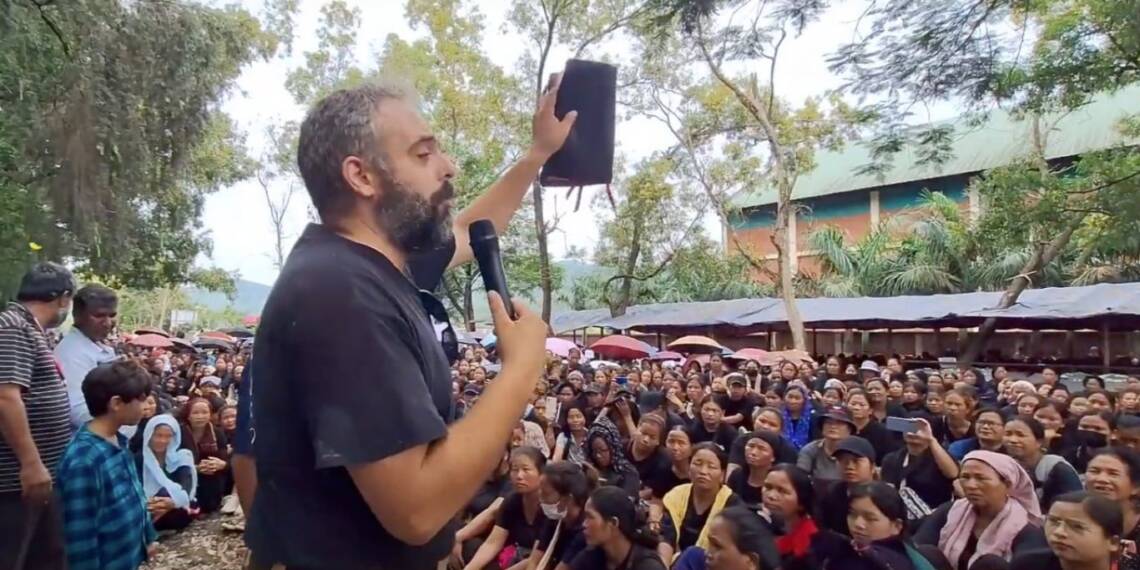The situation in India’s border region continues to remain tense, with Bangladesh and Myanmar already undergoing massive political changes with internal strifes becoming far too common. Many international geopolitical players are using this opportunity to meddle in the affairs of the region.
While the democratically elected Sheikh Hasina’s government has been ousted out of Bangladesh, and the country is primarily governed by the radical jihadist group Jamat-e-Islami. Myanmar is now under the control of the Military Junta that is now involved in a clash with the Arakan Army a rebel military outfit. On the other hand, foreign influences seem to be making a headway into the region to spread further instability.
In the northeast region of India, namely Manipur there are reports of ethnic clashes between two major local groups, the Meiteis and Kukis, making the current ground situation extremely volatile. Ousted Bangladesh Prime Minister Sheikh Hasina has earlier indicated the involvement of the United States in creating a precarious situation in the region for their far-reaching geopolitical objectives.
Now it seems a foreign hand is trying to fuel the ethnic divide between Meiteis and Kukis further fueling the tensions in the region. Tensions in Manipur boiled over when Kukis began protesting against the demands from the Meiteis to be given official tribal status, which the Kukis argued would strengthen their already strong influence on government and society, allowing them to buy land or settle in predominantly Kuki areas.
However, a US missionary is attempting to bring the religious angle of Hindus versus Christians in order to back the idea of a Christian state between India, Bangladesh and Myanmar. The situation in Manipur and the neighbouring Bangladesh and Myanmar, is delicate, and it has opened the doors for elements who are now playing larger geopolitical games.
A newly-surfaced video shows controversial preacher Daniel Stephen Courtney, a US Army veteran, distributing drones and bullet-proof vests to insurgents in Manipur. The drones, arms, and ammunition are not only being distributed behind the curtain of retired army officers, but it seems that some American interests are trying to portray or turn ethnic clashes into religious conflicts. This is the only way to keep the conflict alive by exploiting the inter-community divide.
The retired army personnel are spreading contrived narratives under the “Word of Jesus”, which would fuel separatism in the region. An ex-R&AW Officer, Col. RSN Singh, said, “The situation in Manipur closely resonates with ex-Bangladesh PM Sheikh Hasina’s warning, who claimed that plans were afoot to carve out a ‘separate Christian state’ from parts of Myanmar, Bangladesh & northeastern India. The current scenario looks dangerous for all the countries in the South Asian region.
According to analysts by doing so, the US wants the geopolitical upper hand in South Asia and largely in the Bay of Bengal. Previously, the US had sought a Naval base in Bangladesh, and when Sheikh Hasina denied it, she had to flee. The geopolitical and power politics are back on the International politics due to increasing speculation of the multipolar world. The centre of this power politics is expected to be the Indo-Pacific, especially the Indian Ocean and South China Sea, due to the potential Chinese threat to US dominance.
After five long years, India-China relations look to be on the mend, and both countries have reached an agreement on their long-running border dispute. The US has often angled to get India’s support to counter China’s rise, trying to push it into the Western alliance. However, India’s foreign policy history shows a different picture. The Galwan clash and the standoff between the Indian and Chinese troops were seen as an opportunity by many. However, the India-China detente has destroyed dashed hopes of more foreign interference in the region. Now, to continue their pressure on India, foreign forces seem eager to fuel Hindu persecution in Bangladesh and stir tensions in Manipur—as part of a larger geopolitical strategy against India.
The second speculated reason is the plan to create a Christian state in the middle of South and South East Asia. Notably, there is no Christian state in the region, but a good number of the population (4,479,000 in Myanmar and 1179043 in Manipur) in the region is Christian. During the British colonial period, the population in the area was converted to Christianity, and since then, a surge has been recorded in their population. Now, many foreign lobbies are trying to leverage the converted Christian population and the current political scenario to carve out a separate Christian country for future geopolitical gains.
The Indian government will certainly take cognizance of this unfolding foreign involvement in Manipur and put its diplomatic channels open and intelligence agency alert. On the domestic front, India must act decisively to crush covert foreign operations in the Northeast. Strengthen intelligence and deploy elite counterintelligence teams to dismantle espionage networks. Tighten borders with Myanmar, Bangladesh, and China–plug every infiltration route and choke supply lines. Tensions are sure to rise in the region due to the geopolitical meddling by many foreign lobbies, this will also act as a catalyst for China, USA, Russia and India to vie for a strong position in the region, bringing further turmoil and clashes in the future.








